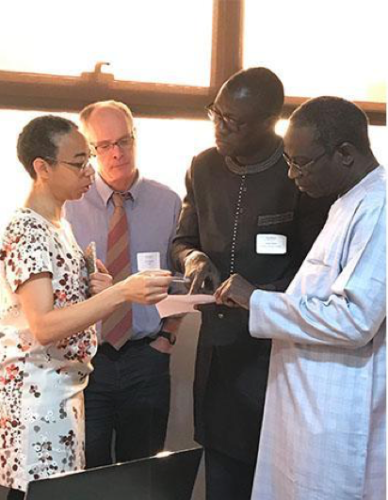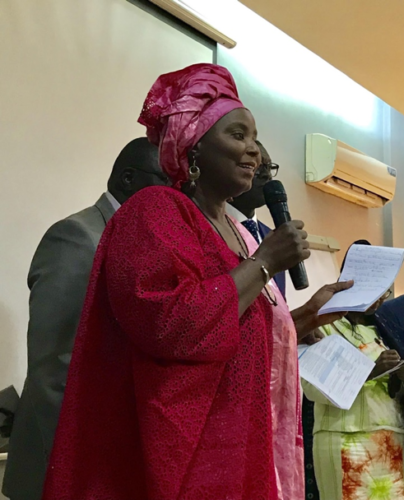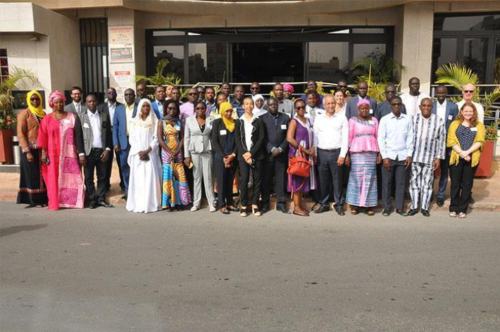Laying a Strong Foundation for Linking Water, Energy and Food Research in West Africa
| The Water-Energy-Food Nexus Blog Series
Delivering water, energy and food for all in a sustainable and equitable way is a major challenge faced by society. The water-energy-food nexus concept aims to address this by better understanding how interactions between water, energy and food are shaped by environmental, economic, social and political changes and how the synergies and trade-offs among them can be better planned and managed. The Water-Energy-Food Nexus Knowledge-Action Network is a network of people and organisations which fosters transdisciplinary research and communicates the importance of holistic system approaches across water, energy and food systems. Acknowledging that the nexus concept is often described as overly academic and not practical on the ground, the Water-Energy-Food Nexus Knowledge-Action Network is organising this blog series to illustrate the role of the nexus concept in addressing local and national challenges of sustainable and equitable access to resources. Understanding the perceptions and entry points with which local and national stakeholders can engage with the nexus concept is key to further implementing nexus approaches, especially in the Global South. Learn more about the Future Earth Water-Energy-Food Nexus Knowledge-Action Network. |
Laying a Strong Foundation for Linking Water, Energy and Food Research in West Africa
By Mary Thompson-Hall, Senior Program Specialist, START and Mariama Camara, Program Specialist, START
West Africa represents a complex tapestry of connections between water, energy and food systems that cross broad temporal and spatial scales. It was this rich landscape that first sparked the idea for a nexus-focused program between START and the Research Fund of Québec (FRQ) in Francophone West Africa. As with many ideas, the vision for what could happen and the real-world mechanics of how that vision could be realized held a host of unforeseen challenges. As an advisory committee of regional and international experts was convened, and discussions between START and their West African team members and FRQ deepened, the reality of how difficult it would be to dive straight in to a program attempting to encompass all or even a concise cross section of the diverse nexus connections in the region began to sink in.
Considerations for what would bring the most value to work on energy, food and water progressed, and it was found that key pieces of knowledge underpinning the energy portion of the nexus were missing. West Africa holds huge untapped potential in renewable energy including with solar, biomass, wind and hydro-power. However, it became clear that many questions remained about whether all of the investments in small scale renewable energy across West African countries were actually helping to push the region’s transition to cleaner energy sources. Further, if this transition was taking place, the details of how small scale renewable energy efforts were playing a role in that transition (i.e. who the key actors are, what the major financing schemes are, and key challenges) remained nebulous.

Carole Brunet, Jon Padgham, Cheikh Mbow, and Madiodio Niasse, members of the ProGREEN West Africa Advisory Committee discuss points to cover in the first assessment team meeting in Dakar, Senegal 2019. Photo Credit: Mary Thompson-Hall.
Recognizing that the answers to these and other key questions were essential to a more comprehensive understanding of current water-energy-food linkages in West Africa, START and FRQ decided to scale back their original vision to target a more concise entry point to the nexus, that of small scale renewable energy. This is how the ProGREEN project was conceived. ProGREEN’s primary focus is to advance understanding of renewable energy in West Africa in the context of 1) conditions that enable or constrain growth of renewable energy, (such as policies, financing, technical aspects, etc.) and 2) the broader development impacts of renewable energy access on agriculture and food, water, and health, as well as dimensions relating to gender and youth. For the first phase of the project, an assessment effort is being initiated with experts, early career researchers and professionals convened from across public, private, government and academic sectors and diverse disciplines in Burkina Faso and Senegal that will run from March until September 2019.
An inception meeting for the ProGREEN assessment activity took place in Dakar, Senegal on 12-14 March 2019. The intention of the meeting was to convene the two country teams to 1) refine the assessment topic and scope, 2) develop a draft action plan for carrying out the assessment, 3) identify decision makers and processes that the assessment will aim to inform and influence, and 4) enable cross-learning between the countries and between the diverse types of expertise present in the teams, with an ultimate goal to strengthen regional networks and develop early career capacities for addressing future challenges.

Madame Yvonne Faye from the ProGREEN Senegal team reports back to the plenary group during the first assessment team meeting in Dakar, Senegal 2019. Photo credit: Mary Thompson-Hall.
The meeting succeeded in all of these objectives, and capacities were strengthened through novel learning across sectors that don’t normally talk with one another. This sentiment was strongly expressed by the participants. According to Yvonne Faye, Managing Director of énergie R in Senegal, “ProGREEN stands out for its holistic and inclusive approach to analyzing the renewable energy sector. With its retrospective and introspective look at the sector of renewable energies, it will inform both decision-makers and practitioners.”
Energy is a bedrock for supporting greater security relating to water and food in West Africa, the region’s transition to more widespread small scale renewable energy will improve water access through pumping/irrigation systems and will boost agricultural productivity and post-harvest value chains. The identification of underlying constraining and enabling factors for progressing this transition by ProGREEN team members will bring deeper, evidence-based insights into the connections that make up the food-energy-water nexus.
Indeed, based on in-depth data collection and analysis of existing and forthcoming projects, programs and studies, the outcomes of this assessment will help to (i) understand and learn from successes and failures in renewable energy programming, (ii) inform and support the implementation of upcoming projects, (iii) bring more meaningful and transparent representation to the needs and experiences of diverse stakeholders, and (iv) bring cross-sectoral expertise for a more holistic analysis. Such information will help advance regional efforts to meet targets 2030 and 2063, the UN Sustainable Development Goal (SDG) and The Africa We Want, respectively. Lastly, these results are vital for improving access and use of renewable energies for a population expected to double and an electricity demand projected to increase fivefold by 2050 (IRENA, 2015).

Participants from Burkina Faso, Senegal, START and the advisory committee at the first ProGREEN Assessment team meeting in Dakar, Senegal 2019. Photo Credit: Mamadou Thiam.
Cited
Interesting literature
IRENA (2015), Africa 2030: Roadmap for a Renewable Energy Future. IRENA, Abu Dhabi.
IRENA (2018), IRENA Planning and prospects for renewable power: West Africa, International Renewable Energy Agency, Abu Dhabi.
DATE
May 16, 2019AUTHOR
Mariama CamaraMary Thompson-Hall
SHARE WITH YOUR NETWORK
RELATED POSTS
Future Earth Member Taikan Oki Wins Stockholm Water Prize 2024
Researchers Urge Uptake of Water Assessment Proposed at UN Water Conference
Future Earth at the UN 2023 Water Conference